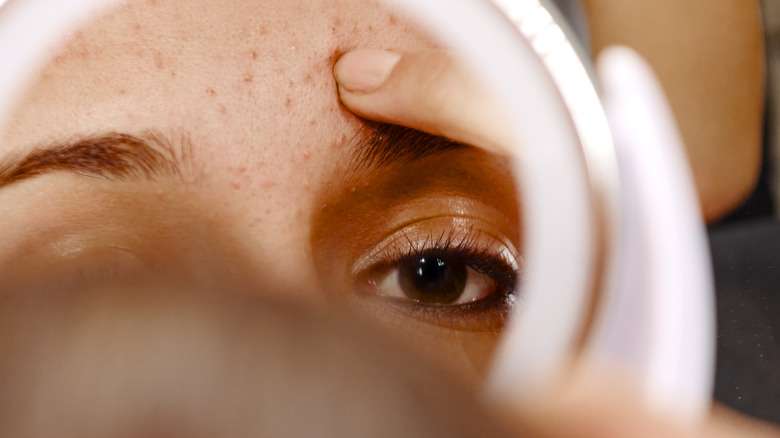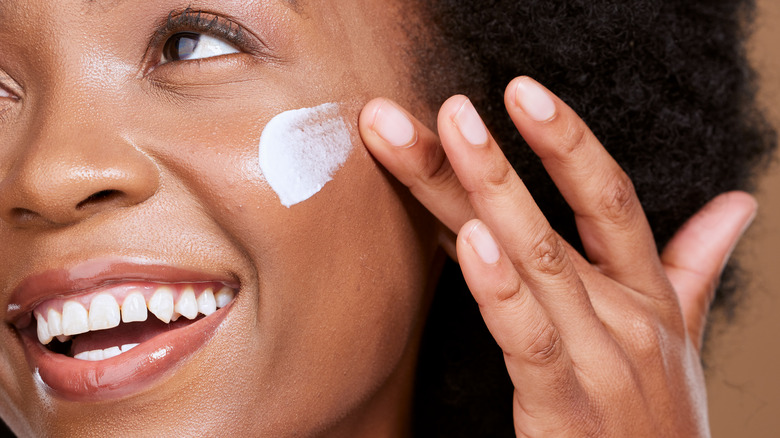How To Use Humectants For Your Most Hydrated Skin Ever
Even if you're not someone who fears the wrath of wrinkles, having healthy, hydrated skin should always be the most important part of your beauty routine. When skin cells are given the hydration they need, they're strong enough to protect against sun, breakouts, toxins, infections, and even skin disease. If you take into consideration that our skin is the only barrier that stands between us and the outside world, then you'll understand why keeping it as healthy as possible means it will keep the rest of you as healthy as possible too, according to the National Institute of Arthritis and Musculoskeletal and Skin Diseases. When it comes to getting that necessary hydration, humectants are the answer.
"A humectant is a substance that is key to keeping the skin hydrated," cosmetic chemist Shuting Hu, B.Sc, PhD told Byrdie. "It's an ingredient that helps draw moisture to the skin's surface and retains water so that the skin does not end up drying out quickly. It is commonly used in face and body products such as serums, lotions, and creams." Humectants that you might already be familiar with are hyaluronic acid, salicylic acid, glycerin, alpha hydroxy acids (AHAs), and even honey, per Medical News Daily.
If you're not using humectants, then it's time to add them to your skincare routine. Their ability to attract moisture and essentially draw water into the skin is exactly what your skin needs to maintain its elasticity and superpower, protective ways.
How to tell if your skin needs humectants
Although everyone, no matter their age or skin type, can benefit from using humectants, some people need them more than others — for example, people with dehydrated skin. Skin that's lacking hydration feels tight and has a texture that looks lackluster. Dehydrated and dry are not the same, but both need hydrating and moisturizing humectants to get back on track, per Coveteur.
"Skin care is not one size fits all," board-certified dermatologist Caren Campbell, MD told Well + Good. "It depends on why you have dry skin and if you suffer from acne, rosacea, or other skin conditions ... Humectants are helpful in combination with emollients for many patients and can be layered."
But as much as humectants can be beneficial to every type of skin, there are times when they can actually cause dehydration. "For people living in humid weather, humectants are great because they pull the moisture from the environment into the skin cells," board-certified dermatologist Annie Gonzalez, MD, FAAD told Coveteur. "But if you live in dry weather, or particularly in cold months, when humidity is lost, humectants can pull too much moisture from your skin and have an adverse effect." In other words, if you find your beloved humectants no longer working properly when winter rolls around, it's time to take a step back on how often you use them.
How to use humectants in your skincare routine
To get the most out of humectants, you want to apply them right after you wash your face. "Humectants should be applied to damp skin, not dry skin (unlike antioxidants, which are best applied on dry skin)," board-certified dermatologist Ava Shamban, MD told MindBodyGreen. This is because humectants attract moisture, so they do their best work when there's water involved.
Although you can just apply your humectant and be done (it is your skin after all), humectants really belong in a lineup of moisturizers. "Any product with humectant ingredients needs to be formulated with other moisturizing ingredients," chemist Danusia Wnek told Good Housekeeping. "The most effective skincare products for hydration are those that are formulated with all three types of moisturizers: humectants, occlusives, and emollients." Each one plays a very effective role in getting your skin to top-notch hydration. Ideally, you should start with your humectant, then apply your emollient, and lock it all in with an occlusive, per Well + Good.
When it comes to hydrating your skin, the general consensus is once to twice a day. But, of course, if you experience that aforementioned adverse effect, then consider doing it once a day instead. While it may seem like a lot of effort if you've yet to have humectants in your skincare routine, just know it's something you'll get used to very quickly. Et voilà! You're on your way to perfectly hydrated skin.


